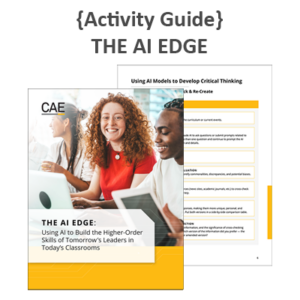CAE professional learning webinar highlighted the need to measure and develop students’ critical thinking, problem solving and written communication skills
The Council for Aid to Education, Inc. (CAE), a nonprofit developer of performance-based and custom assessments that authentically measure students’ essential college and career readiness skills, today shared results of polling conducted during a professional learning webinar, which found K-12 educators largely believe critical thinking and problem solving skills are extremely valuable for academic and career success.
The February 2 live webinar, “Developing Essential Skills for College and Career Readiness: Are Your Students Ready for Their Next Steps?”, focused on written communication as well as critical thinking and problem solving skills that are in high demand by employers, including data literacy, critical reading, and analyzing information.
In a CAE poll of attendees, which included educators, district administrators and school counselors from middle school and high school, 94% said critical thinking and problem solving skills are “extremely valuable” for students’ academic success, while 81% said these skills are “extremely valuable” for career success.
“Content knowledge is only part of what students need to know and apply,” said Doris Zahner, Ph.D., chief academic officer, CAE, who moderated the webinar panel. “Skills such as critical thinking, problem solving, and written communication are the foundation on which content knowledge can be mastered, integrated, and applied. These skills are essential to young people’s success in secondary and higher education, as well as in the workforce. In fact, they are the skills hiring managers are looking for most.”
The panel also included Leighann Lenti, chief of partnership at the University of Virginia Partnership for Leaders in Education, and Matt Montaño, superintendent of Bernalillo Public Schools in New Mexico. The group addressed the increase in value of critical thinking skills, how performance-based assessments deliver actionable insight into those skills, and the need to screen and measure students’ essential skills to identify their mastery level.
“When we think of high school graduation requirements, so much is still based on meeting core subject thresholds,” said Lenti. “A real opportunity exists to think through what matters to prepare our students for their next steps, whether they are entering the workforce or a postsecondary institution. There is room to be intentional in prioritizing essential skills, offering a meaningful and actionable plan, and considering how we further equip educators to support this mission.”
CAE’s data shows that 60% of students are not proficient in these essential skills upon entry into higher education in the U.S. Additionally, by the time they graduate, 44% still are not proficient. As with any skill development, identifying students’ current proficiency and areas for growth are the first steps to prepare them to navigate a rapidly changing and demanding world.
Teaching these essential skills often gets overlooked as educators use limited instructional time to prepare students to meet content-based standards. Many educators also presume that activities to build these skills are incorporated into content-based curricula.
“Developing college and career readiness, and the skills necessary for success, should begin long before ninth grade,” said Montaño. “We must think about these skills as early as students’ elementary school years. So, by the time they enter higher education and the workforce, we’ll have taken the time to develop, assess, measure, and improve their capabilities, and the result will be their increased likelihood for success.”
Additional polling of participants’ perceptions of college and career readiness skills revealed:
- 58% believe their students think critical thinking and problem-solving skills are extremely valuable for their own academic and/or career success
- Over half the respondents reported that instruction of essential skills at their school is not specifically provided
- Less than 5% of respondents reported that they are using an independent, objective assessment to measure students’ critical thinking skills
- Of those using any type of assessment, over 70% use the results for faculty and/or student feedback
The webinar is available for on-demand viewing. CAE has also created a quick Essential College & Career Readiness Skills checklist to keep these skills top-of-mind for curricula and programming for 2022–23.
To learn more about CAE and the CLA+ assessment, visit www.cae.org.
About CAE
A nonprofit organization whose mission is to improve student outcomes, CAE develops performance-based and custom assessments that authentically measure students’ essential college and career readiness skills and identify opportunities for student growth. CAE’s Collegiate Learning Assessment (CLA+) for higher education, College and Career Readiness Assessment (CCRA+) for secondary education, and the new Success Skills Assessment (SSA+) for any level, evaluate the skills educational institutions and employers demand most: critical thinking, problem solving and effective written communication. Based on CAE’s research, these skills are predictive of positive college and career outcomes. CAE also partners with its clients to design innovative performance assessments that measure the constructs vital to students, educators, and institutions, including subject area and grade-specific assessments. Since 2002, more than 800,000 students at over 1,300 secondary and higher education institutions globally have completed CAE’s assessments. To learn more, please visit www.cae.org.


